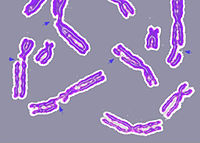
Photo from wikipedia
Excessive accumulation of reactive oxygen species (ROS) has been regarded as a major contributor of pathogenesis in neurodegenerative diseases. N-trans-feruloyltyramine (NTF), an alkaloid isolated from several plants, has demonstrated an… Click to show full abstract
Excessive accumulation of reactive oxygen species (ROS) has been regarded as a major contributor of pathogenesis in neurodegenerative diseases. N-trans-feruloyltyramine (NTF), an alkaloid isolated from several plants, has demonstrated an ability to be a potent antioxidant. In this study, the antioxidative and anti-apoptotic properties of NTF extracted from the stems of Polyalthia suberosa were investigated in the human neuroblastoma cell line SK-N-SH. NTF at concentrations ranging from 10 µM to 500 µM were not toxic to cells and reduced intracellular ROS levels significantly. Furthermore, pre-treatment of NTF significantly decreased H2O2-induced ROS generation and attenuated H2O2-mediated cytotoxicity. An increase in the expression of Bax and activated caspase-3 and reduction of Bcl-2 mediated by H2O2 was reversed by pre-treating the cells with 100 µM NTF. Likewise, NTF suppressed the increase of caspase-3 activity induced by H2O2. In conclusion, the findings reveal that NTF improves H2O2-induced intracellular ROS generation and decreases apoptosis. These protective effects of NTF could be useful for oxidative stress-related neurodegenerative conditions.
Journal Title: Natural Product Communications
Year Published: 2022
Link to full text (if available)
Share on Social Media: Sign Up to like & get
recommendations!